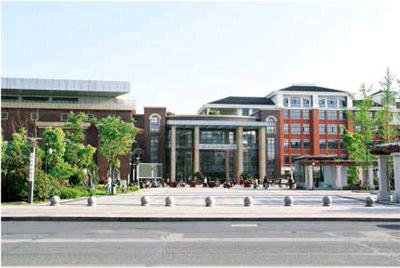张元济与海盐
2017-10-17王英
王英
其人其事可以入藏
今年,浙江海盐将纪念张元济先生(1867—1959)诞辰150周年,他是著名出版家、商务印书馆创始人之一,同时也是一名学者。
30年前的1987年,为了纪念这位中国近现代文化界的名人,海盐人民在县城武原镇文昌路上建起一家以“张元济”名字命名的图书馆,当时,在这里召开了第一届关于张元济的学术研讨会。
张元济图书馆边上附设有涉园,是占地面积8670平方米、建筑面积2500平方米的江南园林式仿古建筑,四围黛瓦粉墙,里面曲桥卧波,亭阁相接,自然成趣。涉园内专设商务版本图书馆和张元济先生纪念室,是张元济图书馆的两大特色,尤其商务版本图书馆,收集、保存、陈列、整理着商务印书馆百年以来的出版物。
1989年秋天,笔者调往张元济图书馆工作,其中一项主要工作就是负责收集商务印书馆版本目录并编制卡片。接受工作之初,笔者首先去上海,那里是张元济工作、学习和生活的地方。在上海辞书出版社王自强的介绍下,笔者从该社图书馆了解到该馆存有许多商务旧版图书,从而开始了对商务版图书的调查。后来,笔者又多次追寻商务印书馆搬迁足迹,赴上海、重庆、北京等地做抄录、检索工作。商务版本图书馆的收藏由此展开。在各地相关单位和个人、特别是商务印书馆的关心和支持下,目前,这里馆藏有新老商务版图书16514种28805册,其中早期(1949年之前)的4500册,成为中国较为完备的集商务版图书、张元济生平资料的收藏基地和研究中心,荣获了“国家一级图书馆”称号。
张元济图书馆吸引无数海内外的专家学者前来瞻仰,举行过多届张元济学术研讨会。今年对张元济的纪念,包括商务印书馆成立120周年、张元济图书馆建馆30周年纪念,也在这里举行。
“家住城南乌夜村”
涉园,本是明末海盐张氏十世先祖张奇龄的书斋,九世先祖张惟赤辟为藏书楼,历代延绵,后毁于清咸丰战火,所剩藏书千余种3700余册。
1932年淞沪抗战爆发,上海商务印书馆及其藏书馆涵芬楼(公共开放)和张元济个人所藏被炸,摧毁惨烈,张元济痛心疾首。1939年初,实业家叶景葵邀张元济创办图书馆,又约民国名人陈陶遗共同发起,成立了(私人事业)合众图书馆,以挽救沦亡古籍,张元济尽数捐出劫后私藏。上世纪50年代并入上海图书馆。后来,目录学家顾廷龙整理了《涵芬楼烬余书录》,版本鉴定家潘景郑则以“涉园”之名,整理有《海盐张氏涉园藏书目录》。为纪念张元济对文化出版事业的贡献,海盐建立张元济图书馆时附设涉园,专门收藏商务版图书。
这其实应当看作是张元济的夙愿。
1867年,张元济出生于广州,当时他的父亲张森玉在那里做官。父亲时常以先祖为官的业绩和藏书、著述的志向教导张元济。
1881年,张元济随母亲回故乡海盐。母亲在县城武原镇虎尾滨买下一座亲戚老宅,稍事修缮后,砖砌的院墙里翠竹森森,有十余间木结构房屋,门窗的色彩经过岁月的沉淀透着历史的沧桑感。
张元济返回乡里,最向往的地方是涉园,可惜,在城南乌夜村的张氏故居,早已一片残垣断壁,但他对祖先的藏书刻书盛业,心生敬慕。后来,张元济能在中国的出版界干出一番事业,应该说与先祖的影响不无关系。
次年,张元济的父亲去世,张元济愈加刻苦攻读。
1892年,张元济中清光绪壬辰科进士,授翰林院庶吉士。1894年甲午战争后,他投身维新潮流之中。1898年戊戌变法失败,张元济遭“革职,永不叙用”的命运。于是,他南下上海,在1901年投资商务印书馆,“以启迪民智,扶助教育为己任”,最终将该馆办成中国首屈一指的文化出版传播机构。
“鄉贤遗著断不可交臂失之”
张元济对中国近现代思想文化发展、甚至对由此推进社会变革的贡献是十分巨大的,同时,他也非常关心家乡古籍文物的保存,将之视为弘扬民族文化、振奋民族精神的重要组成部分。他说:“乡贤遗著断不可交臂失之也。”(致朱希祖信)
张元济历来注意保存海盐先哲遗著,海盐历史上最重要的地方文献《海盐县志》《盐邑志林》,及海盐学者胡震亨、彭孙贻的著作,张元济都出重金搜求,使之不致湮灭,有的还重新刊印。他一生抢救海盐乡贤著作355部1115册。
从1921年开始,张元济与藏书家葛嗣浵、学者王甲荣等人发起续辑嘉兴历史文献《槜李文系》,并主持其事,虽几经中辍,最后得以完成。续辑内容,比原辑约增一倍。张元济亲笔抄录《目录》四册。
1937年初,张元济发起修葺海盐胡震亨墓,也是一例。
胡震亨是明代学者,可以代表海盐一邑的最高文化水准与成就。胡氏有《靖康资鉴录》《李诗通》《海盐图经》等著作,最有影响的《唐音统签》,奠定了其在唐诗研究中的地位。
胡震亨葬于武原城北停驾桥堍,《光绪海盐县志》将之列为重要古迹。民国时,海盐县政府拟圈地改供演兵之用,张元济闻见后,十分愤慨,立即起草了《拟请修复胡墓并拨还墓田以资修葺公呈》,请浙江省政府责成海盐县政府拨还胡氏墓地。同时,他发表文章《海盐两日之见闻》和《谒胡孝辕先生墓记》,呼吁社会各界重视保护古迹,并寄一份给蔡元培,请他向时任省主席朱家骅关说。朱家骅随后致信张元济:撤换县长,重视保护。
然而不久,抗战全面爆发,海盐沦为敌占区,仅存的胡震亨墓遗迹被日寇破坏殆尽。张元济自身有感,深深叹息。
启迪民智,扶助教育
文化的进步,基础于教育。张元济一生献身文化出版事业,其旨归于“启迪民智”。endprint
1904年,清政府废除科举制度。同年,在张元济的擘划下,商务印书馆出版了《最新初等小学国文教科书》,至辛亥革命,已被全国各地的学堂广泛采用。1917年新文化运动发生前夕,商务印书馆又修订那种国文教科书,张元济亲作校订,10年之内重印30余次,印数达七八千万册之巨。其后,张元济组织策划编写了从小学、中学到大学的全套教科书。
本世纪初,我国出版界掀起过一股重新审视老教材的热潮,上海科学技术出版社在那种课本中选辑出若干篇,编为上下两册予以出版印行,好评不绝于途。笔者也特意购买来,放在案头,时时翻阅——虽为小学范本,仍不失指导做人做事的意义——以表达对张元济这位先乡贤的无限敬意和纪念。
因为时政对教育思想的干扰,商务版教科书后来不再继续,但张元济对学统的流布与承继意识依然在胸。
1945年抗战胜利,海盐新办县立初级中学,暂借县城武原镇冯三乐堂房屋作校舍,契约一年。限期将至,学校派人去上海与张元济商量租借其祖宅,张元济不说二话,欣然同意,将坐落于虎尾浜南岸扩建的故居36间房屋,及6.5亩宅基地借予学校使用。自1946年8月起,学校每年只是象征性地付给张氏白米一石作为租费。
1951年4月,张元济写信给海盐县人民政府,表示愿意将虎尾浜的老宅及余地一并捐赠办学。因考虑到祖产系三房共有,在征得同意后,1952年春张元济代表张氏族人无偿捐出。当时,校长在学校大会上宣布这一消息后,全体师生热烈鼓掌,经久不息。
60多年过去,这学校改建成规模、质量在海盐、嘉兴、浙江名列前茅的向阳小学。
“及身已见太平来”
张元济有过多次表示,文化教育对社会变革和进步的影响,体现在民间风俗的移易上。
1920年,张元济还乡。他发现族中有浮棺暂厝的現象,一打听才知道是清贫者无力举葬、以待他日筹钱厚葬,便与自家仲良叔祖商议建一公墓,仲良叔祖当即表示支持。1925年,坐落在乌夜村涉园故址西边的张氏公墓落成,“近傍秦溪,远挹秦峰,风景颇佳”。这座由张元济设计并独立承担费用的张氏公墓,浸透了他移风易俗、革除陋习的心愿。
张氏族人拟定有《张氏宗祠公墓规则》,其核心就是号召薄葬。为了施行倡议,翌年清明,张元济带头将发妻吾夫人的棺柩,从海盐澉浦的翠屏山自己父母墓侧移至张氏公墓落葬,仅“穴地三尺,纳棺其中”而已,葬费不到4元大洋!张元济希望张氏子孙牢记古人成子高的话:“吾纵生无益于人,吾可以死害于人乎哉?”
1934年,张元济继室许夫人去世,他不接待吊唁,不收受帛金,只刊发了《张元济敬谢(告)亲友启》。一个月后,他携全家回海盐,在张氏公墓简单地安葬了许夫人。张氏公墓开办12年,收葬200余人,带动了海盐民众的移风易俗。
1959年,张元济在上海病逝,骨灰安葬在联谊山庄公墓。“文化大革命”中,张元济墓遭到破坏,骨灰盒被服务过张元济的张树年悄悄带回海盐,凭着当地老农的追忆,找到吾夫人、许夫人墓穴的大致位置,深深埋下。
前些年,海盐县政协张国华与笔者专门访问张树年,张树年表态:“入土为安,不要再搞迁葬了。”
张元济无疑是名声超越海盐的人物,只要涉园在,无墓又何妨?
(本文图片由作者提供)
Zhang Yuanji and His Hometown Haiyan
By Wang Ying
The year 2017 marks the 150th anniversary of the birthday of Zhang Yuanji (1867-1959), a publisher and founding father of Commercial Press, one of Chinas most prestigious publishing houses. He was a native of Haiyan, a county near Hangzhou in the northern part of Zhejiang Province. In 1987, Haiyan County had a new county library built at Wenchang Road, Wuyuan Town, which is the county capital, and named it after Zhang Yuanji. A seminar was held at the site in commemoration of the scholarly native.
Beside the library stands Sheyuan Garden, which is a modern reincarnation of the home of Zhang Yuanji in Haiyan. The original garden was destroyed in war in the mid 19th century. The new site covers an area of 8,670 square meters with a building with a 2,500-m2 floor space in the regional architectural style. The building comprises two parts: a larger part of the building houses a collection of books published by Commercial Press over the past 100 years. The smaller part is a memorial room dedicated to the memory of Zhang Yuanji.endprint
Sheyuan Garden is a key part of Zhuang Yuanji Library. The collection has 28,805 copies in 16,514 titles in total, including 4,500 copies published before 1949, the year the Peoples Republic of China came into being. The collection is not complete, but large enough to be of national significance. The memorial room presents a relatively complete life story of the publisher. For this reason, Zhuang Yuanji Library in Haiyan County is a national class-one library.
The original Sheyuan was built as a private place for reading books in the last years of the Ming (1368-1644) by Zhang Qiling, a tenth-generation descendent of the Zhang clan in Haiyan. His son Zhang Weichi started a private collection of books. The collection of 3,700 volumes in over 1,000 titles was destroyed in a war in the mid 19th century. Zhang Yuanji himself started a collection in Shanghai. Commercial Press, then located in Shanghai, was partly damaged by bombs dropped by Japanese bombers in 1932. Also devastated was the publishing houses public library and Zhangs private collection. In early 1939, Zhang donated all the remaining books in his private collection to a library in Shanghai. These books were donated to Shanghai Library in the 1950s. Though the Zhang familys first collection of books housed at Sheyuan and part of Zhangs private collection housed in Shanghai were destroyed, bibliographer Gu Tinglong managed to put together a complete list of books in Zhang Yuanjis private collection, including information on both books that were destroyed in the bombing and those that survived the bombing, and bibliographer Pan Jingze restored a list of books in the collection housed at Sheyuan Garden in the Zhang clan in Haiyan.
Haiyan honors Zhang Yuanji not only because he founded the influential Commercial Press but also because he did a lot for Haiyan.
He paid a fortune to put together a collection of books written by local scholars of Haiyan and books about Haiyan such as the county annals. He also reprinted some of the books he had salvaged at his own expenses. Altogether, he saved 1,115 volumes in 355 titles authored by Haiyan native scholars.
In 1921, Zhang Yuanji and some fellow scholars started a project to expand an anthology of works by local writers in Jiaxing (Haiyan is a county under the jurisdiction of Jiaxing, a central city in northern Zhejiang). The new anthology was 100 percent bigger than the original one, including 4 volumes of contents Zhang Yuanji copied personally.endprint
Hu Zhenheng, a prominent scholar of the Ming Dynasty (1368-1644), represents the very top of the cultured people of Haiyan. In the early years of the Republic of China (1911-1949), the place where Hus tomb was situated was reassigned for military purposes by the county government. After learning the proposal, Zhang Yuanji was incensed. He sent a petition to the provincial government, asking the provincial authorities to urge the county government to restore the tomb and gave back the land. Eventually, the county magistrate was dismissed for the decision. However, the tomb was totally destroyed by Japanese aggressors before it could be restored.
During a visit to hometown Haiyan in 1920, Zhang Yuanji noticed some relatives could not afford costly funeral and burial services. The dead were left in coffins and unburied. He proposed to his uncle, a clan head, for setting up a public cemetery for the clan. He designed the cemetery and footed the bill. His two wives were buried there. He called for reforming and simplifying elaborate funeral and burial services. The clan formulated a list of dos and donts for proper and affordable funeral and burial services, based on the principle that no funeral and burial services should bankrupt a family. From 1925 when the cemetery was set up to 1937 when Chinas Resistance War against Japanese Aggression broke out in full force, over 200 members of the local Zhang clan were buried at the cemetery, setting up an example in Haiyan for saying goodbye to an ancient custom and for accepting a modern practice.
In 1946, Zhang Yuanji signed an agreement to let a local middle school use his 3,000-m2 ancestral compound with 30 rooms as the campus. He charged a symbolic annual fee of 50 kilogram of rice. In the spring of 1952, he and his clan donated the property to the local government to be permanently used as a school campus. It is now the campus of one of the best primary schools in the province.endprint
